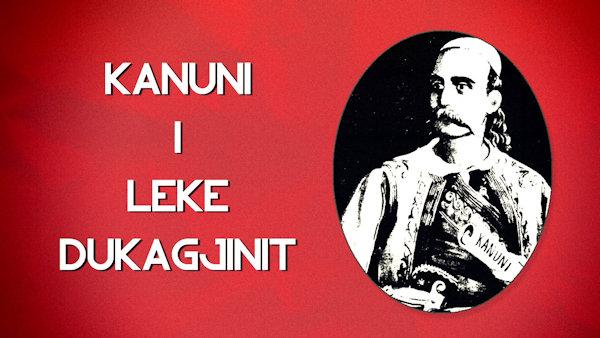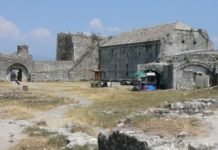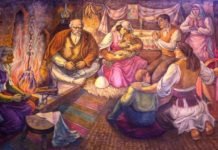SQ – Kodi penal në “Kanunin e Lekë Dukagjinit” – Ligji zakonor shqiptar nga Zef Ahmeti
DE – Das Strafrecht im “Kanun von Lekë Dukagjini” – Das albanische Gewohnheitsrecht von Zef Ahmeti
– The Albanian customary law –
— by Kan. lic. iura. Zef Ahmeti, Univ. St. Gallen, Switzerland
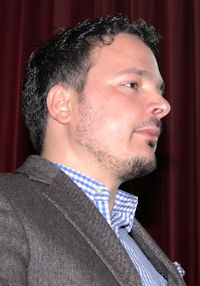 The Albanian expression for the customary law of the Albanians is Kanun. This word was taken over out of Sumerian (gi, Rohr) over Acadian (qanu, Rohr) to the Hebrew (qane, Rohr) and from there to the Greek (kanna, Rohr) and to canons, where it was trained further and meant “rule, standard”. The main meaning of the Kanun on Albanian, is the customary law.
The Albanian expression for the customary law of the Albanians is Kanun. This word was taken over out of Sumerian (gi, Rohr) over Acadian (qanu, Rohr) to the Hebrew (qane, Rohr) and from there to the Greek (kanna, Rohr) and to canons, where it was trained further and meant “rule, standard”. The main meaning of the Kanun on Albanian, is the customary law.
The sources of the customary law of the Albanians are: Kanuni i Skënderbeut, Kanuni i Malsisë së Madhe, Kanuni i Labërisë, Kanuni i Lekë Dukagjinit (KLD). In this work, I will treat the most well-known customary law of the Albanians and/or the criminal law in the Kanun of Lekë Dukagjini (KLD).
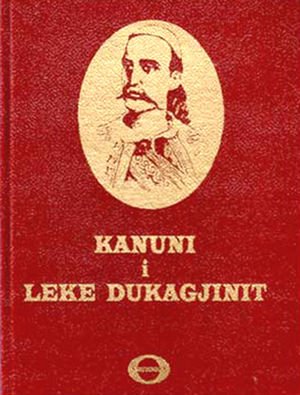
The admission of the KLD in written form from verbal excessive quantity was taken by the Franciscan Shtjefën Gjegjovi of Kosova. He began to publish the right statutes collected by him in the year 1913 in the magazine of the Albanian Franciscan “Hylli i Dritës”. After its murder by Serbs on 14.10.1929, other Franciscans systematized the left material and published it under the name “Kanuni i Lekë Dukagjinit”. The customary law “Kanuni” was divided in 1263 §§ and into twelve books. The Kanun regulated both civil and criminal questions. This Codex was at the same time the actual Albanian condition for many centuries up to the Second World War.
Due to this distinction the Albanian customary law protected the following goods:
a. the goods of the body and
b. of the soul.
Under accessories of the person fall:
c. the actions and
d. conditions.
a. The goods of the body
The goods of the body after the customary law of the Albanians could be hurt by impact, mutilating and by death.
a. a. The fight
The impact was a consequence of anger, a battle of words or a threat. Fights between the adults on the one hand and the children on the other hand, were treated differently.
A fight, which happened between two adults, and if from it blood flowed, rather as honoring injury as bodily injury was considered. If the bodily injury were not so large, it was understood that the person who got hurt of the body could pay back in the same way. The fight in the public as well as that fight, which arrived at ears of the public, produced a rising hate.
The fight between children was not taken seriously. Even if the child were struck by a man from the relationship, it was presupposed that it had happened as a “punishment”.
a. b. mutilating
By mutilating one understands a separating or the injury of any part of the body. In the Kanun a wound under peace, which was caused by the weapon, fell. The Albanian customary law did not make a large distinction between intentional and unintentional mutilating. Unintentional mutilating was measured with more indulgence. The reason for this indistinct distinction lay probably in the fact that the possibility should be taken to the author of being able to state to its defense that the act happened negligently for his part, even if it added deliberately the wound.
Intentional were the cases if someone directed deliberately the weapon against another and wounded it. On the other hand under unintentional (negligent) mutilating, one understood those by coincidence and without intention added wound. This occurred then, e.g. if someone wanted to meet the enemy however an indifferent one meets.
Independently of it, whether one added intentionally or unintentionally a wound to someone by the weapon, the wounded one had the right to revenge himself according to the principle “wound for wound”.
a. c. the death and the blood revenge
Around the blood revenge under the Albanian trunks of “own ‘category’ of the blood revenge historiography developed, in which Austrian and German travelers and scientists were particularly active. The blood revenge was presented to the readers as something sensational.” Depending upon the author, they aroused the impression that the life of the Albanians was only concerned around blood revenge. I do not share the same opinion.
The nature of the blood revenge existed therein that one had the right to revenge for the death of own blood relatives. According to the Kanun, one differentiated between retaliation (hakmarrja) and blood revenge (gjakmarrja). The retaliation came to the course, if someone were damaged by stealing at the fortune. The damaged one had the right for its stolen fortune, a retaliation to exercise after the maxim “stealing for stealing”. The blood revenge was a consequence of the earlier committed murders or injuries of the honor. The author, supported by the rules of the Kanun, was that one, which killed with own hand (§ 848). Other involved one in a murder and/or a blood revenge was the aid/accomplice (§ 831), the accomplice (§ 766). In addition of this, more down follows.
A certain group of persons were preserved by the blood revenge, like women, children, the priest, old and ill humans as well as spirit patients.
The homicide without intention was not pursued. The author had to remain however hidden, for a long time, as it is called in the Kanun, “the blood is hot” (the excitation lasted) and the case was well examined and clarified (§ 933ff). Now the mediators (so-called “reasonable people”) occurred, in order to confirm that really the homicide was unintentional. If the mediators stated that the homicide was without intention, the author had to pay only a blood penalty (§ 934).
After an execution of the blood revenge the author (dorasi) had to inform even the public and the family of the victim that he practiced blood revenge. In the case of a death or blood revenge, it was forbidden exercising massacre by the author to the victim. If someone added further wounds with a measurer after the death at the body of the victim, the author was charged with double murder, i.e. he had to be pulled for responsibility not only for a murder, but for two.
The woman remained exempted from blood revenge. Against them, none was allowed to exercise blood revenge. If no male person were in the house, and who has not yet carried out revenge, the woman had to revenge. She could be killed only in the case of adultery, otherwise killing a woman – it was intentional or unintentional – was a large dishonor. Even the weapons, by which a wound or a death of a woman was caused, were considered as “worthlessly” (unworthily) to be used for war purposes.
If the author without authorization (for someone else) exercised blood revenge, his house was burned and down-cleverly, the entire mobile fortune, as for instance furniture, grain, cattle was confiscated. He had to leave the dwelling and its master areas with the whole family and pay a penalty.
a. d. switching and peace vow
The mediator (ndermjetsi) is called that one, which interfered, in order of the “bad words to decide” (për me da fjalët e kqia) i.e. the risen tension as consequence of the disputes to turn gossip away, which could lead to the revenge, from the homicide and other spoiling development (§667). The mediator had admission everywhere. Mediator could be man and woman (very rarely and only into small things), also the priest (§ 669). In order to decide on an evil, the priest interfered not in the own name, but in the name of the parish or the trunk (§ 675). The experienced men were mostly mediators.
The murder could switching with any friend after committed an act around the relatives (family) of the killing, to ask for granting some sucked, and to be able to receive “days off” (vow) around the peace vow for some days. During the period of vow, no revenge could be exercised. The vow was extremely rarely granted to that person, who implemented the murder.
The God peace (besa) was in the Kanun one period of the liberty and the security, which granted the house of the killing to the author and his family members, in order to pursue it not immediately and a certain period ago for the blood. One regarded the grant of a peace vow, as obligation of the maleness (§ 854ff).
The Kanun knew two kinds of the peace vow: 24 hours and 30 days. The vow of 24 hours occurred, if the house of the killing granted peace vow to the author, then this (the author) participated at the dead celebration, although he had killed, and was charged for the kill. This peace vow did not last longer than 24 hours. The village could arrange an expiration of these 24 h. peace vow period over for the author and its house members an extract of a further vow of 30 days. If the house of the killing did not grant the village peace for the family of the author, the author with its house members had to remain enclosed, it stepped a kind of house arrest, house prison.
During the “weapon peace vow” reached by the mediator in a controversy, it was forbade the revenge exercising. However if the promised killed the enemy before the period of the armistice ran off, then revenge for the hurt vow was incumbent on to take to the vow receiver (i.e. the mediator).
Those, which went to parents and cousins of the killing, on behalf of the author and his house, the God peace attained, called one peace bringer (bestari). They were not considered as protectors of the author and his house, thus an evil could not happen within the peace vow (§851ff).
a. d. a. the switching of the blood (dorzanët e gjakut)
Another kind of the switching in the Kanun was the switching of the blood (dorzanët e gjakut). A mediator of the blood was that one, which himself endeavored in the house of the killing, he reconciled with the author. The mediator (several can be), was looked for and/or selected by the house of the author (§ 972ff). A reconciliation of the blood could be made on two levels:
1. as the heart friends went into the house of the killing and the catholic minister;
2. by money to the house of the killing.
The house of the killing selected the deviancy guarantees for the money of the blood. The citizen of the blood (dorzani i gjakut) was the mediator, who intervened, in order to prevent each “renewal of hate and fire” (§ 974ff). The oldest ones and the outstanding and reasonable men of the place determined the period for the payment of the money for the blood. The determined time fixed for payment for the blood could not be extended, neither changed.
a. d. b. the blood brother shank, the blood drinking (Vllaznimi, me pi gjak)
This happens, if the author himself with his house and the house of the killing reconciled. The involved ones soaked mutually their blood. Into two small glasses filled with liquor (Raki) or water; One of the friends (ndonjë prej dashamirësh) tied the small finger for the author and “master of the blood”, and punctured it with a needle and let a blood drop to fall individually into the glasses. After mixture of the blood they exchanged the glasses and it was enough for them also to over-cross their hands, so that everyone drank the blood of the other one. With “1000 joy calls (congratulations, congratulations) they shot off with the cans” and became from enemies to brothers, as it meant in the Kanun: “new brothers of the same father, the same mother” (§988).
b. the property of the soul
By the property of the soul mainly the honor was understood. After Albanian customary law one bore rather death as the injury of the honor. An injury of the honor could take place on three levels:
a. violating of women,
b. removal of the weapon,
c. injury of the right of protection.
These kinds of the honor injuries were so heavy that they were to be washed off only with blood. For this injury of the goods of the soul there was neither grace still another possibility, whereby they could be settled with fine.
b. a. violating the women
This crime occurred rarely. But if it was noticed that a woman was raped, the rapist was pursued and punished. Sooner or later, the rapist had to penance for his act “with his own blood”. However if adultery was stated that the sexual intercourse happened with agreement of the wife, then both paid for with own blood. If someone let himself in however with an engaged girl, then the family of the author stood in blood revenge with the family of the bridegroom. The honor of the woman was a property-part of the honor of the man. If he was dishonored, this was the heaviest injury of the honor of a man.
b. b. injury of the honor by weapon robbery
An injury of the honor by weapon robbery was in two different kinds: publicly or secretly. Public weapon robbery happened if one had to deliver the weapon with force or obligation. The secret weapon robbery on the other hand could be made according to a kind of thief on the nighttime or day. It is interesting that the public weapon robbery for the robbing was a dishonor. For the robbing the public weapon robbery was immediately also a shame. For this reason, it was not allowed to let the larger disgrace appear in the public, as log as he with blood “the greatest dishonor” had to whip out himself. The sanction for the secret weapon robbery was moderated. One could forgive the thief a tax however he had for it to carry out in the height as for a murder.
Honoring injuries could not be paid off by contributions of equipment. For the robbed honor there was no penalty. It could be replaced not by articles, but only by pouring the blood or by noble assigning after the switching of the friend of heart (§ 597 600).
A further distinction in the question of the honor devide the customary law of the Albanians between personal honor (ndera vetjake, § 593 to 601) and public honor (ndera shoqnore, § 602-639).
b. b. a. the personal honor
The Kanun of the Albanian mountains did not differentiate humans from humans (§ 593). For the injury of the personal honor the Kanun said: “whom you want, forgive him; if you like, then (or) wash the clouded forehead” (§ 595), i.e. revenge. After § 596 everyone had its own honor for himself, and nobody could interfere. There was a kind of the discrimination prohibition between the men. The life of the good one and the bad one had the same value: “the Kanun took (considered) both for (as) men” (§594). Supported by these two regulations, as well as by the rule in § 887, those means: “the price of human lives is alike for the good one as for the bad ones”, is to be taken as a kind of equal treatment principle, which however was applied only between men. The robbed personal honor could not be restored by penalty, but only with blood (death) or assigning (Ndera e marrun nuk shpërblehet me gja, por a me të derdhun të gjakut, a me të falun fisnikërisht. § 598).
b. b. b. the public honor
The public honor covers the question of the guest in the house, hospitality and house right. By patent right it was understood protecting a guest (mikut). One differentiated between injury of hospitality and the house right. We will illustrate this distinction in two examples:
Example 1: House right
X comes into the house of Y. As long as X remained in the house of Y, Y was obligated for the security of X. If it happened something to Y in the house of the X, then X was obliged to revenge for him, because the act of violence at Y was considered as an injury of the house right.
Example 2: Hospitality
This case has to be understood, as injury of hospitality against someone: if Y was one of the authors, and he went in the house of X, he was allowed in no case to suffer damage from X, until he (Y) went to another house, because this meant an injury of the hospitality principle.
c. theft and robbery
In accordance with Kanun under robbery, the acquisition of the property was understand over a strange case by open force (§ book 768. h as well as § 777ff.), while the theft happens secretly. The thief was after Kanun that one, “that with own hand stolen the stranger” (§ 768). The robbery by open force was understood as injury of the honor.
c. a. aid/accomplice
As participants at a theft in accordance with Kanun were the thief (cubi), the aid (simahorët), that house, where the thieves of the stealing eat, or got bread. Aid or accomplice was also, who hid the stolen property (“the thief and aid are both guiltily”, §768 book. d). If someone helped, which was not in the blood revenge, he fell in the blood revenge (§ 831). The sanction for a stolen property at fortunes was arranged after principle “two for one”. “Two for unity” became both for cattle and for flock or for the stolen article.
Example:
If a thief stole a cow, the owner had the right to take it back, where always it was found, also when someone the stolen cow bought. If the salesman (the thief) were seized, he had to pay to the owner the value of two cows for the stolen cow, and/or which owners compensate according to the principle “two for unity”, and the thief had to return the whole paid sum to the buyer.
b. The aid of aid
A form of the complicity in the Kanun was the accomplice. Accomplice was that one, who helped someone by criminal interference and commit a crime from behind (§ 766). The punishment for such assistance and acceptation of stolen goods was different. When helping during a woman kidnapping, it fell in the blood and had to pay to the village a penalty at a value of 100 groshs; it fell also with a murder in the blood and had to pay to the village 500 groshs, as well as each burglary and each property, which were stolen in the village, he had to paid for after the Kanun, “as soon as it became recognized (discovered)” (§ 767).
a. kinds of court
The Albanian customary law knew two kinds of the Councils of Elders. For the small Council of Elders (§ 999) the senior of the village was taken, after brother shank and kinships, which decided for less large disputes. Serious affairs, which hurt the honor of the village and trunk, were judged by the village elders and master heads (§1003). In order to be able to fall a judgment, the oldest ones and heads of the trunk the oldest ones and over-oldest of the village were referred, in which the suspicious one lived (§1004). If an old resolution concerned a whole village or a trunk, the individual people judges (oldest ones) did not have the right to take the thing into the hand. In such cases (circumstances), “the legal oldest ones of the village or trunk considered” (decided) (§1009). Under advice of the oldest ones all fell, i.e. even if it concerned outstanding families, or master chieftains (§ 1014).
b. The right and obligations of the oldest ones
Also the Elders, which exercised their work as judges, had rights and obligations after the Kanun.
In accordance with § 996 the Elders had the right, each threat and each controversy to simple, each from homicide adult claim, the mark by quality, other time by force, in community with the village, even when very serious threats (the order) could support it, the men of the trunk demand, around “the outer edge and to bring the case to a reason”. Furthermore, if someone did not want to add himself to the impartial verdict, the oldest ones could meet the whole village. If a verdict pleases, and it repented the controversy parties that they had handed, the oldest one who became out of the pledge for subjecting, could not change this verdict (§ 1001).
The obligation of the oldest ones was the impartiality, and they could not be affected by gossip (§1015). If it happened that these obligations of the oldest ones were hurt by any of them, he was never more selected as honorees to the oldest one. Before one began with the process, the oldest ones had an oath that they would not judge with underhandedly and party manners, and the fact that they will not rotate the rules of Kanun (abuses), but a fair judgement after best knowledge and certain to fall.
c. Court instances
In the customary law of the Albanians the regulation applied for “oldest ones over the oldest one, judgement over judgement, oath over oath, were not given”. Due to this regulation, is to be closed that the Kanun knew only one instance of the jurisdiction. An appointment against the judgements of the oldest ones was followed only in exceptional cases; it could not be raised on the part of the parties. Only in addition of the owners of the distrainer were entitled, if they stated that an unfair judgement was pleased. The oldest ones returned not the distrainer, but were obligated, like it were called “to clean-wash himself”, i.e. in that they hands the distrainer to the selected oldest ones lay, and thus the judgement of the second oldest ones became pleases (§ 1038ff).
d. The voice of the people with (in) the court
If a decision of the heads and oldest ones did not please the people, or it found, they had wrongly decided, the people had the right to not follow (respect) it. In such a case, the heads and oldest one had to advise the case again, to treat it again.
e. The evidence
The Albanian customary law in the legal proceedings after Kanun knew the following evidence: Confession, the word of honor, the secret prosecutor (këpucari), (that person, who indicates someone debt, was as for instance a secret theft or murder), the oath, the oath aid, the witnesses, the trace-track (§ 769), the citizens of the village, as well as surprising at the scene (inflagranti).
f. Kinds of punishing
In accordance with § 13 of the Kanun, under punishment was understood that an evil was imposed by the legal force for making one debt. The kinds of the punishment into the Albanian customary law were: Death sentence, discharging from the trunk with members and possession, the burning of the house, the breaking and letting of the soil or cutting off fruit trees, the penalty with living cattle, the penalty by money, and the guilty one (the author) was explained by the trunk for bird free (expel, proclaimed, me e leçitë = out clips). Burning alive of a woman, a widow or girls, who showed themselves as violated.
The revenge and feud, which similarities with those rules in the Kanun, were present also in the Germanic time. The sense of the revenge and feud was after Germanic view “humiliating the opponent and its kinship”. The blood revenge was in German history on 16th Century. With the God peace movement of 11th Century, known as church movement, one has tried a pacification of certain persons to limit things, places as well as times with certain actions in relation to feud in order by the national peace to be replaced later.
The Albanian customary law did not know the Inquisition’s process. And body-met, kinds of mutilating detention as in the German criminal jurisdiction and torture do not occur, because they would not be compatible with honour of the adults men. While the Catholic Church in German criminal law history in the Middle Ages played a role, the Albanian customary law made a separation between Kanun and church. In accordance with § 3 the church is not subordinate to the Kanun but its church court. For this reason the master court could not do it any read imposes. For misdemeanors of the priest, the Kanun said, raises the municipality complaint to the church-upper, with the bishop (§ 3 exp. 2.).
By the kinds of the death penalty in German punishing history such as slopes, beheading, buried alive, drowning, burning, wheels, simmering in water or oil, the Albanian customary law only knew burning. The mutilating punishments, which we know from German criminal law history, as for instance knocking the hand, knocking off individual fingers or finger limbs, knocking off a foot, cutting or peeling of the tongue, did not came in the Kanun forwards.
Despite this strange history the Albanian people could develop its own culture of the right. Lately one very often confounded the usual criminality with the blood revenge. For the practice of a blood revenge, as we saw above, one had to adhere to certain rules. The blood revenge is an aspect of a comprehensive juridical system, the customary law.
The habit standards are today really outdated. The processing of the Kanun exhibits heavy errors. On the one hand it is considered as backwardly and medieval, in particular if the blood revenge comes to the language. In addition, on the other hand beautiful things are present, on which one is pride, like hospitality, Besa etc., which one would gladly still keep.
Bibliography Main source
– The Kanun, translation into German of Marie Amelie Freiin of Godin, published in Pejë 2001, Kosova.
Further literature
– Benussi, Zef: Përmbledhje sistematike e zakoneve juridike të vjetra shqiptare [Systematically collection of Albanian old customary juridical laws], Skriptum, Shkodër 1958.
– Brestovci, Shkumbim, remarks over the role of the Kanun in the Albanian society, unpublished work.
– Basha, Eqrem, Robert Elsie, Rexhep Ismajli (Hg.) Journeys in the Balkans, the life memories of the baron Franz Nopcsa, Pejë 2001.
– Kaser, Karl, Hirten, Kaempfer, Stammeshelden, Vienna, Cologne, Weimar 1992.
– Kadare Imail: Eskili ky humbës i madh [Aeschylus, this great loser], Prishtinë, 1990.
– Kempner, Robert: Of Albania constitution, in: Yearbook of the public right, volume XIV 1926, separate casting, Tübingen 1926.
– Kanuni i Lekë Dukagjinit, Përmbledhur dhe kodifikuar nga Shtjefën Gjeçovi, Prishtinë 1972.
– Haefner, Lars: Shkipetari right, in: new type character, Albania Swiss magazine for co-operation with Albania, http://www.albanien.ch/nla/nr06/Art03.html.
– Popovci, Syrja: Shtjefën Gjegjovi 1874-1929, in: Kanuni i Lekë Dukagjinit, Prishtinë 1972, P. 1-93.
– Pichler, Robert, the power of the habit – the Dukagjini trunks and their customary law, in: Albania master life between tradition and modern trend, Helmut Eberhard / Karl Kaser (Hg), Vienna – Cologne – Weimar 1995.
– Schmidt, Neke Michael, the Kanun of the Albanian mountains: Background of the north Albanian way of life, in: Dardania magazine for history, culture, literature and politics, No. 5/1996, P. 183-199.
– Schmidt Eberhard: Introduction of the history of the German criminal jurisdiction, Göttingen 1965.
– Thallóczy, Ludwig, Kanuni i Lekës, a contribution to the Albanian customary law, in: Illyrian Albanian research, volume I, Munich and Leipzig 1916.
– Wörtz, Tilman, “Two finger-broadly honour gave us God on the forehead”, in: http://www.zeitenspiegel.de/autor/woertz/re1/main.html
– Dictionary of the Christianity, Orbis publishing house, Vienna 1995.
– Wolfgang Sellert / H. Rueping: Study and source book for the history of the German criminal jurisdiction, Scientia publishing house, volume I 1985.
Verlag, Band I 1985.
— Translated from the German original by a computer program;
— Corrected a little afterwards (due to the lack of time) by Arben Çokaj.

